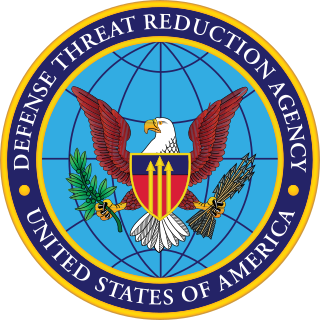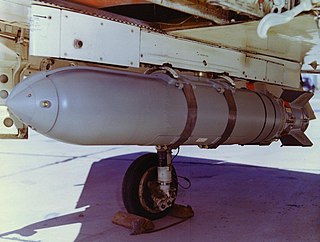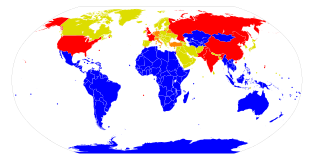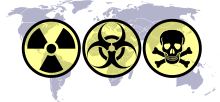
The Treaty on the Non-Proliferation of Nuclear Weapons, commonly known as the Non-Proliferation Treaty or NPT, is an international treaty whose objective is to prevent the spread of nuclear weapons and weapons technology, to promote cooperation in the peaceful uses of nuclear energy, and to further the goal of achieving nuclear disarmament and general and complete disarmament. Between 1965 and 1968, the treaty was negotiated by the Eighteen Nation Committee on Disarmament, a United Nations-sponsored organization based in Geneva, Switzerland.

A weapon of mass destruction (WMD) is a biological, chemical, radiological, nuclear, or any other weapon that can kill or significantly harm many people or cause great damage to artificial structures, natural structures, or the biosphere. The scope and usage of the term has evolved and been disputed, often signifying more politically than technically. Originally coined in reference to aerial bombing with chemical explosives during World War II, it has later come to refer to large-scale weaponry of warfare-related technologies, such as biological, chemical, radiological, or nuclear warfare.

The Iraq disarmament crisis was claimed as one of the primary issues that led to the multinational invasion of Iraq on 20 March 2003.

The Biological Weapons Convention (BWC), or Biological and Toxin Weapons Convention (BTWC), is a disarmament treaty that effectively bans biological and toxin weapons by prohibiting their development, production, acquisition, transfer, stockpiling and use. The treaty's full name is the Convention on the Prohibition of the Development, Production and Stockpiling of Bacteriological (Biological) and Toxin Weapons and on their Destruction.

United Nations Security Council Resolution 687 was adopted on 3 April 1991. After reaffirming resolutions 660, 661, 662, 664, 665, 666, 667, 669, 670, 674, 677, 678 and 686 (1991), the Council set the terms, in a comprehensive resolution, with which Iraq was to comply after losing the Gulf War. Resolution 687 was passed by 12 votes to one (Cuba) against, with two abstentions from Ecuador and Yemen, after a very extended meeting. Iraq accepted the provisions of the resolution on 6 April 1991.

The Defense Threat Reduction Agency (DTRA) is both a defense agency and a combat support agency within the United States Department of Defense (DoD) for countering weapons of mass destruction and supporting the nuclear enterprise. Its stated mission is to provide "cross-cutting solutions to enable the Department of Defense, the United States Government, and international partners to Deter strategic attack against the United States and its allies; Prevent, reduce, and counter WMD and emerging threats; and Prevail against WMD-armed adversaries in crisis and conflict." DTRA is headquartered in Fort Belvoir, Virginia. The DTRA mission, organization and management, responsibilities and functions, relationships, authorities, and administration are defined in DoD Directive 5105.62, Defense Threat Reduction Agency (DTRA).

The Proliferation Security Initiative (PSI) is a global effort that aims to stop trafficking of weapons of mass destruction (WMD), their delivery systems, and related materials to and from states and non-state actors of proliferation concern. Launched by United States President, George W. Bush in May 2003 at a meeting in Kraków, Poland, the PSI has now grown to include the endorsement of 105 nations around the world, including Russia, Canada, the United Kingdom, Australia, France, Germany, Italy, Argentina, Japan, the Netherlands, Poland, Singapore, New Zealand, Republic of Korea and Norway.

United Nations Security Council resolution 825, adopted on 11 May 1993, called upon the Democratic People's Republic of Korea to reconsider its decision to withdraw from the Treaty on the Non-Proliferation of Nuclear Weapons and allow weapons inspectors from the International Atomic Energy Agency (IAEA) into the country, after it had previously refused entry.

United Nations Security Council Resolution 1718 was adopted unanimously by the United Nations Security Council on October 14, 2006. The resolution, passed under Chapter VII, Article 41, of the UN Charter, imposes a series of economic and commercial sanctions on the Democratic People's Republic of Korea in the aftermath of that nation's claimed nuclear test of October 9, 2006.

United Nations Security Council Resolution 1696, adopted on July 31, 2006, after expressing concern at the intentions of the nuclear programme of Iran, the Council demanded that Iran halt its uranium enrichment programme.
This article deals with activities of the U.S. Central Intelligence Agency, specifically dealing with arms control, weapons of mass destruction (WMD) and weapons proliferation. It attempts to look at the process of tasking and analyzing, rather than the problem itself, other than whether the CIA's efforts match its legal mandate or assists in treaty compliance. In some cases, the details of a country's programs are introduced because they present a problem in analysis. For example, if Country X's policymakers truly believe in certain history that may not actually be factual, an analyst trying to understand Country X's policymakers needs to be able to understand their approach to an issue.

The UN Office for Disarmament Affairs (UNODA) is an Office of the United Nations Secretariat established in January 1998 as the Department for Disarmament Affairs, part of United Nations Secretary-General Kofi Annan's plan to reform the UN as presented in his report to the General Assembly in July 1997.
The Commission on the Prevention of Weapons of Mass Destruction Proliferation and Terrorism of the United States Congress was set up "to assess, within 180 days, any and all of the nation's activities, initiatives, and programs to prevent weapons of mass destruction proliferation and terrorism." The Graham/Talent WMD Commission was also asked to provide concrete recommendations- a roadmap- to address these threats.
The Global Initiative to Combat Nuclear Terrorism (GICNT) is an international organization consisting of 89 countries that have endorsed a set of nuclear security principles for nuclear terrorism deterrence, prevention, detection, and response. It is co-chaired by the United States and Russia. The organization aims to develop partnership capacity to combat nuclear terrorism, consistent with national legal authorities and obligations as well as relevant international legal frameworks such as the Convention for the Suppression of Acts of Nuclear Terrorism, the Convention on the Physical Protection of Nuclear Material, and United Nations Security Council Resolutions 1373 and 1540.

United Nations Security Council Resolution 1929, adopted on 9 June 2010, after recalling resolutions 1696 (2006), 1737 (2006), 1747 (2007), 1803 (2008), 1835 (2008) and 1887 (2009) concerning the topics of Iran and non-proliferation, the Council noted that Iran had failed to comply with previous Security Council resolutions concerning its nuclear program and imposed further sanctions on the country.

United Nations Security Council Resolution 1977, adopted unanimously on April 20, 2011, after recalling resolutions 1540 (2004), 1673 (2006) and 1810 (2008) concerning non-proliferation —to monitor efforts to prevent weapons of mass destruction from being acquired by terrorists or other non-state actors.

United Nations Security Council Resolution 1673, adopted unanimously on April 27, 2006, after considering a report from the Committee of the Security Council established in Resolution 1540 (2004) concerning non-proliferation, the Council extended the mandate of the Committee monitoring the resolution's implementation concerning weapons of mass destruction and their means of delivery until April 27, 2008.

The Middle East nuclear weapon free zone (MENWFZ) is a proposed agreement similar to other nuclear-weapon-free zones. Steps towards the establishment of such a zone began in the 1960s led to a joint declaration by Egypt and Iran in 1974 which resulted in a General Assembly resolution. Following the 1995 NPT Review Conference, the International Atomic Energy Agency (IAEA) held a series of meetings involving experts and academics to consider ways to advance this process.
United Nations Security Council Resolution 1810 was unanimously adopted on 25 April 2008.
The G7-led Global Partnership Against the Spread of Weapons and Materials of Mass Destruction is an international security initiative announced at the 2002 G8 summit in Kananaskis, Canada, in response to the September 11 attacks. It is the primary multilateral group that coordinates funding and in-kind support to help vulnerable countries around the world combat the spread of weapons and materials of mass destruction (WMDs).















